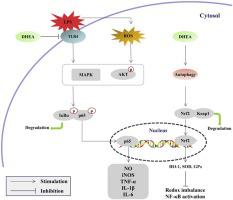Molecular Immunology ( IF 3.2 ) Pub Date : 2021-01-16 , DOI: 10.1016/j.molimm.2020.12.023 Ji Cao , Qian Li , Xuehuai Shen , Yao Yao , Longlong Li , Haitian Ma

|
Dehydroepiandrosterone (DHEA) is the major steroid hormone in humans and animals, which can regulate the body’s inflammatory responses. However, the detail mechanism of this beneficial function is still poorly understood. The present study aimed to explore the anti-inflammation effect of DHEA and its underlying molecular mechanism in lipopolysaccharide (LPS)-stimulated RAW 264.7 macrophages. The findings showed that DHEA significantly inhibited the inflammation-related mediators production and pro-inflammatory cytokines expression level. Further research found that DHEA obviously blocked the LPS-stimulated PI3K/AKT, MAPK and NF-κB activation in RAW 264.7 cells. Meanwhile, DHEA enhanced the autophagy-dependent Keap1 protein degradation, subsequently activated the Nrf2 pathway to alleviate the redox imbalance and inflammatory responses. In conclusion, our data demonstrated that DHEA suppresses inflammatory responses through the activation of Nrf2 and inhibition of NF-κB in LPS-stimulated macrophages.
中文翻译:

脱氢表雄酮通过激活RAW264.7巨噬细胞中的Nrf2减弱LPS诱导的炎症反应
脱氢表雄酮(DHEA)是人和动物中的主要类固醇激素,可以调节人体的炎症反应。但是,对该有益功能的详细机制仍知之甚少。本研究旨在探讨脱氢表雄酮(DHEA)在脂多糖(LPS)刺激的RAW 264.7巨噬细胞中的抗炎作用及其潜在的分子机制。研究结果表明,脱氢表雄酮显着抑制炎症相关介质的产生和促炎细胞因子的表达水平。进一步的研究发现,DHEA明显阻断了LPS刺激的RAW 264.7细胞中PI3K / AKT,MAPK和NF-κB的活化。同时,DHEA增强了自噬依赖性Keap1蛋白的降解,随后激活了Nrf2途径以减轻氧化还原失衡和炎症反应。











































 京公网安备 11010802027423号
京公网安备 11010802027423号